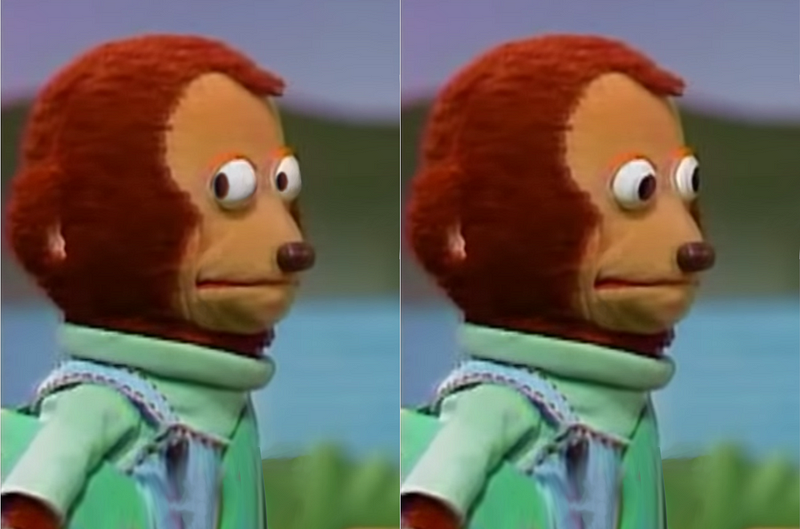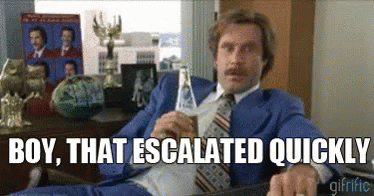The silly revelation

The silly revelation
Yesterday I went to my second Japanese class and I think I had a kind of trip back in time to my kindergarten days.
I had enough time without this feeling like so defenseless on an intellectual level tryin and wanting to learn something that I have no idea and at the same time it’s so complicated for my little brain.
Japanese is not a trivial thing to learn: various writing systems, phonetics, the culture immersed inside their learning, in short, it’s something that takes years to be able to start a conversation with someone from there.
This lack of habit of not being exposed to a completely unknown subject and at the same time demands a great effort of learning, gave me a kind of intellectual slap in which I had this conclusion or personal fact:
When we are old, we are afraid to learn new things.
I know many people (and sometimes I include myself) who unfortunately feel comfortable with what little piece of knowledge that we have in our brains, that sometimes useful in some certain areas of life (sometimes not so much).
And this is wrong.
It’s sad to see how, with so much information available, there is not a minimum of desire and interest to try to change our intellectual reality, logically considering that each day that passes is one less to learn or demystify something that we mistakenly think we know.
It’s that stupid “illusion of knowledge” that usually comes up to us and that often automatically conditions our behavior completely.
This “defense mechanism of our comfort zone” stops and frozen us to learn new things, either for fear of changing our current paradigms of thought with which we feel very safe or simply for comfort, until the fact of getting to fight with whoever is to make them assert themselves above anyone.
This silly revelation left me with 3 big questions:
Why do we run away from learning new things?
Could it be that feeling of feeling silly at first that we ran away from or just comfort?
Is it fear of the unknown or the tranquility that being ignorant gives us or simply the fear that our way of thinking will change us?
These are questions that came to my mind because it’s paradoxical that in the middle of the “knowledge society” (although there are many people who maintain that we are increasingly stupid as a result of technology) this type of behavior is more common than you think. with the people around us and sometimes even with ourselves.
Learn new things or run directly to the comfort zone
At work or in the same daily routine, we learn when we are forced to do it, rarely does that need to learn arise or that it’s born self-imposed by the simple desire to know (just a few bunch of people do that).
Usually the flow to learn something new is something like this:
We have to face the problem.
If my brain does not know how to solve it, I search like others did (I will google this one).
I learn on the go how to use the tools that help me solve it.
Iterate in the process until find the solution of the problem.Perhaps I will make a retrospective of this situation.
When we were in school, learning was compulsory and we did this process from time to time to learn new things.
We were not frustrated not to understand in the first, nor the second, nor the tenth time in the attempt to learn.
Tolerance was high to failure and the thirst for knowledge was innate in us.
It was the only way to learn and begin to understand the world around us. We didn’t have any escapatory: learn or learn.
There was something innate in us that drove us to knowledge, perhaps because it was simply written on a genetic level within us.
Over time, the different realities that accompanied us over the time (epigenetics?) shaped this continuous need for knowledge and conditioned us to decide if it was necessary or not to learn something new every day.
It’s sad to see how some people stopped learning for quite some time, surely from the moment when they were no longer “forced” to do so and saw no need to continue doing so.
They closed the curtain and with what they know it’s enough for them to live the day-to-day adventures of their routines.
Today there are a few adults who have an innate need to continue being like when we were children. This may perhaps be due to being at the forefront of knowledge in their professional / intellectual field or simply because of a simple hunger for knowledge.
When it comes to learning and staying at work, we must be clear that everything depends on the nature of our work, there are some more analytical than others, but we can always be learning and complementing what we know.
Even the guy who sells pizzas, which could be thought of as automatic and simple work and without much to learn at a glance, but he can learn new ways to make dough, new ways to market the product, new cooking alternatives, new tastes, etc.
As Naval Ravikant says in one of his podcasts:
The number of “do” iterations is what drives the learning curve, not the number of hours doing the exact same thing without thinking.
Learning should be a hobby or a way of seeing life, simply to know and interpret it in the best possible way.
But this is complicated. Today there are many distractors in the environment and every time we face the possibility of learning something new, our brain asks (hypothetically) 2 questions like this:
What do I gain from learning something unknown if I don’t need it right now?
Am I really going to spend my “valuable time” trying to learn something new without reporting any immediate material gain?
And we usually answer no and no.
After a few seconds and with a relative feeling of guilt, the brain draws a conclusion of this style:
The truth is that I prefer to distract myself, it’s “free” and 0 level of effort and I don’t need to focus my attention on something complicated, distraction generates me dopamine, my favorite drug.
The best of all is that I am distracted at my fingertips thanks to social networks and if I get bored of them I can continue procrastinating that I also like to do a lot.
The need to learn by simply learning
If there is no self-imposed thirst for knowledge, it’s impossible to get out of ignorance helped by someone.
I don’t know what are the explanations why sometimes it costs us so much to want to learn something new or we simply close ours brains to do that, but it’s something that must be fought as much as possible.
It’s obvious that it’s a reality that exist a lot of people who feel comfortable with their ignorance (and always they are the majority that decide our future in the next elections) and it’s good that they do so, each one in his own, but I do not share it.
Someone who has no desire to learn new things is an ignorant and as an individual contributes less or nothing to our society and less and nothing in a working environment.
I’m not saying that everyone should be a scientist or a freaky fan of knowledge, that would be stupid, but wanting to be a little less ignorant than yesterday is a plus that I consider valuable as a human being.
If you fell some skeptical regarding this pseudo-analysis, it is good that you can answer this question just for yourself:
When was the last time you learned something completely new because you just want to and it was not an obligation from a third party?

The old parrot
Going back to the fear of some people for learning new things, at a mature stage of life, we must remember that the culprit of this whole situation is this stupid spanish/latin-american saying:
“Old parrot doesn’t learn to talk”
For me it is one of the most destructive sayings that exists (I know that I went overboard with this definition and that what I am saying sounds a little crazy) but this saying is largely the culprit that many of us feel good and at ease in the land of the total ignorance.
Personally I think someone invented this saying just to justify their own ignorance to others and in that way they can leave him alone, but the thing escalate very quickly in our subconscious collective minds and became a cult saying.

That saying is one of the most damaging forms of mind programming I’ve ever seen.
These are just a simple words that are automatically embedded in our brains and as a “charm” and condition us to assume that we cannot learn anything new.
And also this saying has become the best resource to use to throw the towel at any time when the things start to get complicated.
This mental resource is made by our brain for himself more valid today than ever before with the “culture of immediate”, which surrounds us in real time, allowing the ideal scenario to be generated to keep us dispersed and make us desist from focusing on learning something that is really worthwhile for us.
The cost of being ignorant and artificial intelligence
There is a kind of self-imposed rule on a personal level of learning to live with our intellectual limitations and doing nothing to change that reality.
It is almost a fact and a few are the privileged who realize this and reverse it in their favor.
It is very easy to learn to be ignorant and it is free, but it can be very expensive in the not distant future.
In this knowledge society that we living right now, have the “pro-ignorant” attitude is a contradiction, but it is more common than we think.
When it is said that the cost of being ignorant in our jobs is dangerous thing, it’s enough to see the latest trends in technology and realize that they all converge on one thing: artificial intelligence (IA).
Yes, that intelligence that is not human, that is within some computer systems constantly training and learning with immense amounts of data (that we generate ourselves) and that surely in a short time will be doing our work in a better way than us and in a way cheaper and more optimized.
Just look at the news from a few months ago when Facebook had to “turn off” 2 IA programs because they had already invented a language between them and communicated autonomously. Terminator is coming.
If you have a profession that uses computers or that your daily tasks can be modeled at a computational level in some way, I think it is necessary to think about a “plan B and also why not plan Z”.
Perhaps at least considering the possibility of learning something additional / complementary to our work, since it could later serve us to defend ourselves in a not so dystopian and ultra-automated future is a good way to embrace the future.
Without going too far, artificial intelligence is a concern (and a blessing for those who know how to use it and take advantage of it in this particular times) that many of us have today and that will increase with the passage of time, since living with it implies a change of paradigms of thought and even of behavior of the society in which we currently live.
We are increasingly “governed” by algorithms that want to know what we think, what we want and what we like. Knowing them, learning from them, and developing them is a competitive advantage over the rest of the people who want to remain ignorant as right now.
So those who are accustomed to not thinking much and find it difficult to adapt to new changes, may in less time than they think, inevitably have to transform into “unemployable individuals” and have to re-think their existence to try to insert themselves into a highly automated society.
In conclusion (at least…)
Feeling silly when you want to learn something new and stumbling at the beginning is the most normal thing that can happen to us, the only important thing is to try not to be impatient and be consistent over time.
High tolerance to failure = assured learning = success.
The high tolerance to failure between the iterations of failed learning is what will give us the competitive advantage over those who do not pass the filter of the 2 questions that our brain asked himself if it worth whether or not learning something new.
The satisfaction of not being lees ignorant as we were yesterday is gratifying and although it doesn’t generate an instantaneous monetary value, it generates an intellectual value that is worth assuming.
It is what will help us to be valuable in a highly competitive society and what will allow us to develop in ourselves what Scott Adams calls the “talent stack”
Investing some time in some books, reading a good article, taking a course on any unknown topic or one that simply interests us, can change our way of thinking radically and benefit us in the short term.
This will eventually provide us with thetools that allow us to adapt and perform better in our daily life as well as on a professional level.
The best way to counter that way of thinking and walking through life with a stupid “illusion of knowledge”, is always having at hand the well-known reflection of Socrates:
“I only know that I know nothing”
And to be open to learn. The world of knowledge is vast and our knowledge of it is negligible.
Being humble in intellectual terms and hungry for knowledge makes us predisposed to success in any level of your life.
It is not by chance that the richer people in the world are the brightest, and they live most of their days trying to learn new things and reading about the most varied topics.
Realizing that we feel a bit silly because we are temporarily neophytes on a specific topic should make us feel good because we know that at this exact moment that we are taking the first step towards a new experience of new knowledge.
By striving to be less ignorant every day through continuous learning, we can increase our chances of having a “decent job” when the machines rule the world.
Thanks for reading!